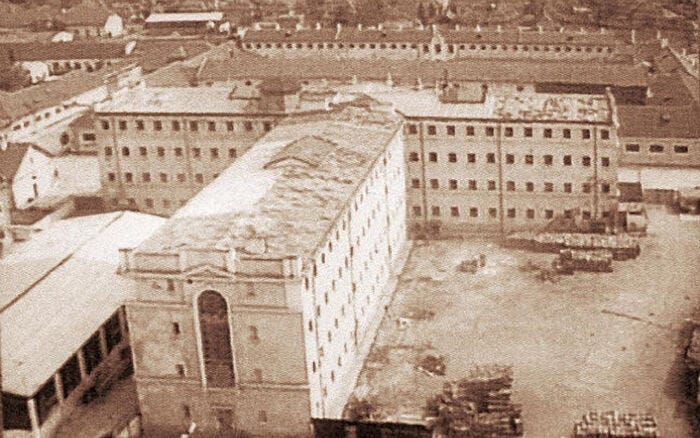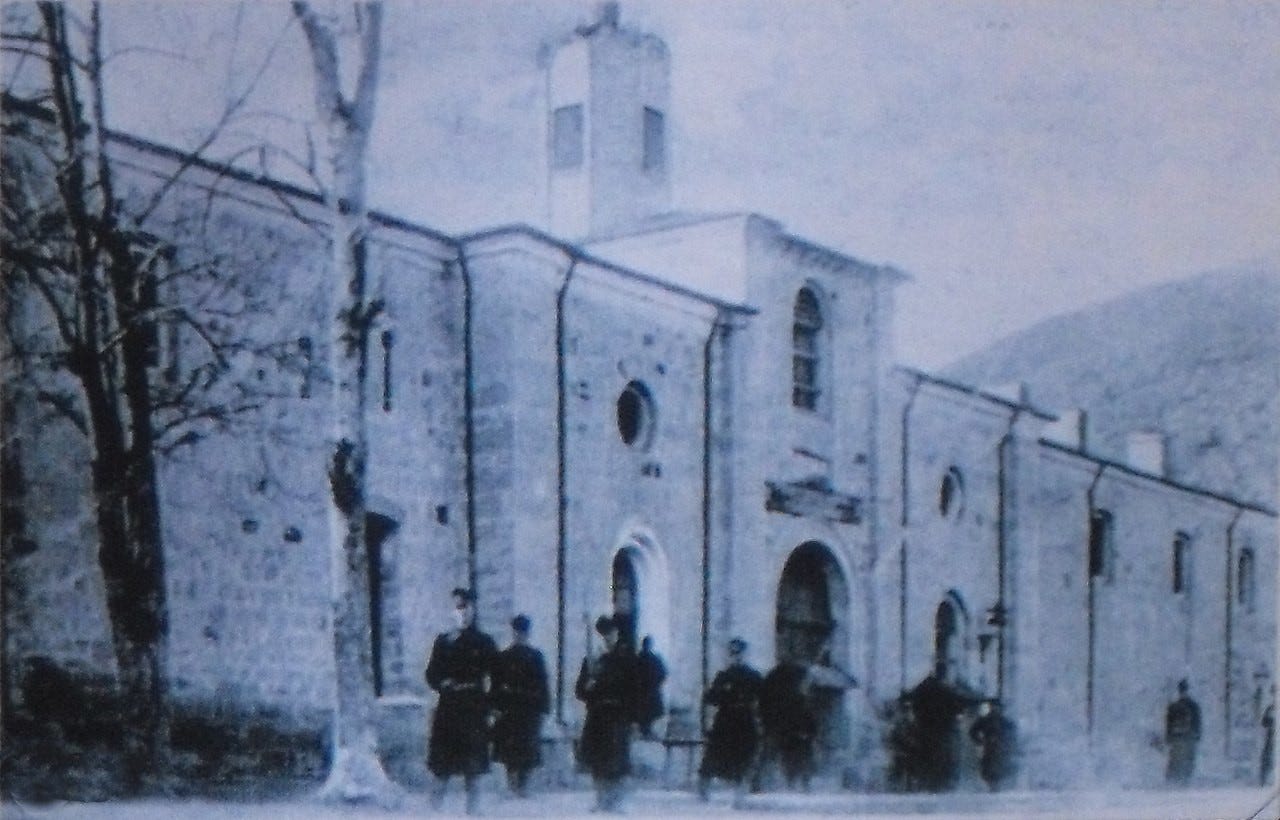Christmas in Room Number Four (The Death Room)
Richard Wurmbrand Tells a Christmas Story from a Communist Prison
I want to share with you a special Christmas story from Richard Wurmband’s autobiographical book, In God's Underground. (You can also listen here.)
In case you don't know who Richard Wurmband is, here's a brief introduction:
He was a Lutheran minister in Romania who spent 14 years in Communist prisons, including three in solitary confinement.
After “escaping” abroad, he published ”Tortured for Christ" in the 1960s and testified to Congress about the torture he had experienced.
Helped start Voice of the Martyrs, but his son Michael doesn’t trust VOM. (You can read Michael Wurmbrand’s VOM letter here.)
Michael Wurmbrand’s ministry provides many of his father’s books for free in a variety of languages!
The following excerpt from “In God’s Underground” has been lightly edited:
Waiting to Die in Room Number Four
[After the arduous journey to the remote mountain hospital prison called Tirgul-Ocna, my doctor friend Aldea] took my temperature and made his check. I asked, "How am I?" and I saw his eyes were wet. "I won't deceive you," he answered. "There's nothing we can do. You may have about two weeks to live. Try to eat what they give you, although it's not good. Otherwise . . .He touched my shoulder and moved on.
During the next few days, two men who had been with me in the cart died. I heard another of them pleading hoarsely with Aldea, "I swear I'm better. Doctor. The fever's going down. Today I coughed blood only once. Don't let them put me in Room Four." I asked the man who brought my watery gruel what happened in Room Four. He set the plate down carefully and replied, "That's where you go when they know there's no hope."
I tried to eat the gruel but couldn't manage it. Someone fed me with a spoon. The food wouldn't stay down. Dr. Aldea said, "I'm sorry, but they insist. You'll have to go to Room Four." There I rejoined my other companions from the cart. Twelve beds, far too close together, and a few small bedside tables filled the room. It was on the ground floor. The big windows were thrown open and we could see prisoners working in the vegetable patch; and beyond that high walls and barbed wire.
I might already have been dead. Prisoners crossed themselves as they passed the foot of my bed. Most of the time, I lay in a coma. If I groaned, others turned me over or lifted water to my cracked lips. Dr. Aldea was helpless. "If only we could lay hands on some modern drugs," he said. A new American discovery called streptomycin was said to be doing wonders against tuberculosis, but when Aldea asked for it, he was told that the so-called cures were lying "imperialist propaganda."
During the next two weeks, all four men who had entered the room with me died, one after another. As I clung to life, Dr. Aldea's look of pity began to change to bewilderment. Sometimes in my delirium I was not sure myself whether I was alive or dead. At night I slept in brief snatches, jolted awake by sharp stabs of agony. Pus ran from a dozen sores in my body; my chest was swollen with it. I spat blood daily and the disease had also affected my spine. Fellow prisoners turned me on my side an average of forty times a night to ease the pain. With soul and body linked by the most tenuous ties, I moved to the borders of the physical world.
To the amazement of the doctors, I survived the first crisis and the worst of my fever passed, although I had no medicine. While my illness grew little better, my mind was clear for longer spells each day; I even began to take stock of my surroundings and companions. It was a quiet place with no alarm bells, no shouting guards—indeed, virtually no guards at all. Fearing infection, they kept away from the patients.
Tirgul Ocna Prison was administered from a distance, and so, through indifference and neglect, became one of the freer prisons in Romania. Nothing was provided for the prisoners, who had to wear the clothes in which they had been arrested. These were often years old, and now and then were patched with any cloth that could be found.
Food was brought by common criminals to the door of the political section, and from there the [political prisoners] carried it to the various cells. Those who could walk went to the bucket for their rations; the others were given it in bed. For every meal there was watery cabbage or bean soup or a thin gruel made from maize or barley. Prisoners who were well enough cultivated the plot encircling the building; the rest lay listlessly on their plank beds, passing the hours with gossip (ie, telling inside stories about the regime).
In Room Four—the Death Room, as it was called, since no one had yet left it alive—the atmosphere was altogether different…As my eyes traveled from one gaunt, transparent face to another, I realized that we were certainly a strange collection:
Abbot Iscu of Tismana, on my right, was the saintly head of one of our historic monasteries.
A youth of nineteen, Vasilescu, to my left, had been the Abbot's overseer when they were both in the slave camps of the Danube-Black Sea canal project that the Communists had launched the year after my arrest.
There was a police sergeant, Bucur, who swore that the doctors had put him in Room Four to satisfy their personal malice.
General Tobescu, a former chief of police.
Then came two Communist guerrillas who had fled to Romania after taking the losing side in the Greek civil war: like many of their comrades, they were immediately arrested for not having fought successfully.
Then Valeriu Gafencu, of the Iron Guard, who had been sentenced at the age of eighteen—ten years before.
Next to him, raw-boned Aristar, a farmer whose nightly prayer was, "God smite the Communists."
Then Badaras, who had sheltered a nationalist from the Secret Police.
All these men died, and their places were taken by others, during the thirty months I spent in Room Four. But, remarkable as it may seem, not one of these hundreds of men died an atheist. Fascists, Communists, saints, murderers, thieves, priests, rich landowners and the poorest peasants were locked together in the same, small cell. There were often bitter quarrels, degrading incidents. Yet, no one died without making his peace with God and man.
Christmas in Room Number Four
Winter came on, with heavy snowstorms. Thick icicles hung from the roof and hoarfrost patterned the window panes. Outside, the cold made you gasp. By December the snow was six feet deep. Old-timers declared it the coldest winter for a hundred years. There was no heating, but until now we had had two or three blankets each, instead of the regulation one, for every time a man died in Room Four we took his bed clothing. Then there was an inspection—and we were left with a single threadbare blanket apiece. We slept in our clothes all winter. Often we went without bread. The soup, made of carrots too rotten to be sold, became thinner still.
On Christmas Eve, prison talk became more serious. There were few quarrels, no swearing, little laughter. Every man thought of those he loved, and there was a sense of communion with the rest of mankind, who were usually so remote from our lives. I spoke of Christ, but what an effort it was. My feet and hands were cold as steel, my teeth chattered, and an icy lump of hunger in my stomach seemed to spread through my body until only the heart lived. When I could continue no longer, Aristar, the young farmer, took up where I'd left off. He had never been to school. Yet he talked so naturally, describing the scene of the Nativity as if it had happened in his own barn that week, that there were tears in the eyes of his listeners.
Somewhere in the prison a man began to sing. At first his voice was quiet, and hardly penetrated my thoughts of my wife and son. But gradually it swelled wonderfully in the crisp, clear air until it rang through the corridors, and everyone stopped what he was doing to listen. We were very quiet when he finished his song. The guards, huddled in their quarters around a coke stove, did not stir all evening.
We began to tell stories, and when I was asked for one, I thought of the song, and told them this old Jewish legend:
"King Saul of Israel brought David, the shepherd honored for killing Goliath, to his court. David loved music and was delighted to see a harp of great beauty standing in the palace. Saul said, 'I paid much for that instrument, but I was deceived. All my musicians have tried. In vain. It produces only ugly sounds.'
David took it up to try, and drew from it music so exquisite that every man was moved. The harp seemed to laugh and sing and weep. King Saul asked, 'How is it that all the musicians I called brought discord from this harp, and only you could bring out music?’
David, the future king, replied, 'Before me, each man tried to play his song on these strings. But I sang to the harp its own song. I recalled how it had been a young tree, with birds that chirped in its branches and limbs green with leaves that blossomed in the sun. I reminded it of the day when men came to cut it down; and you heard it weep under my fingers.
I explained then that this is not the end. Its death as a tree meant the start of a new life in which it would glorify God, as a harp; and you heard how it rejoiced under my hands.
So when the Messiah comes, many will try to sing on His harp their own songs, and their tunes will be harsh. We must sing on His harp His own song, the song of His life, passions, joys, sufferings, death and resurrection. Only then will the music be true.’”
It was a song like this we heard that Christmas in the jail of Tirgul-Ocna.





